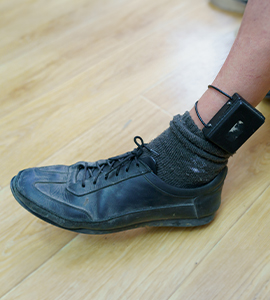Pre-Trial Release Options – What Happens When I am Arrested?
When first arrested, a person is taken to see a Court Commissioner who will decide if that person will be released into the community. The determination as to whether or not a Court Commissioner releases someone is based upon two factors, the defendant’s risk of flight and their danger to the community. In this article, we will discuss what pre-trial release options may be available to you as well as what you can expect throughout the process.
Risk of Flight and Danger to the Community
Risk of Flight is a determination as to whether or not an individual defendant is likely to show up in court for trial on their trial date. In determining whether someone presents a risk of flight, the Court Commission will look at a number of factors:
Criminal History + Failures to Appear
Have they ever been arrested before, and if so did they appear at trial or did they fail to appear? If someone has a history of failing to appear, a Court Commissioner may have concerns as to their appearance in court for this new case.
Ties to the Community
How attached is the defendant to the surrounding community in which the court is located? Do they...
- Live in the jurisdiction and if so, for how long?
- Sustain a stable home address?
- Have a lease/mortgage?
- Work a job, and if so, for how long?
- Have family in the community? (Children? Parents? Siblings?)
- Own a business/real estate in this jurisdiction?
- Stay involved in their community/church/local associations?
The second factor that a court commissioner must review when deciding to release a defendant is whether or not they would be a danger to the community if released. Danger to the community is determined by a number of factors which include:
The Nature of the Crime with Which They Are Charged
Crimes of violence (assault, sex offense, distribution of narcotics, etc.) and the individuals who are accused of committing them are perceived to present a greater risk to public safety, and often result in a court commissioner denying a defendant pretrial release.
Petty crimes (theft, driving under the influence (DUI), driving while suspended, drug possession, etc.) often result in a defendant being released on their own recognizance (ROR) with a promise to appear for court at some later date.
Crimes committed by people who are already on pretrial release for certain crimes (for instance possession with intent to distribute narcotics) and who are charged in a second case for the same crime cannot be released by a commissioner for a second pretrial release and must wait to see a judge.
Defendant charged with crimes that carry a maximum penalty of life in prison may not be released by a court commissioner.
If a court commissioner decides to release a defendant, they may do so in a number of different ways.
Bail (which may be posted in a number of ways)
Bail Bond
A bail bond is an insurance policy sold by a bail bondsman (technically an insurance agent who sells an insurance policy to the defendant which pays the bond amount to the Court if the Defendant fails to appear). Bail bonds cost 10% of the amount of the bond (i.e. at $10,000.00 bail would cost $1,000.00). The fee paid to the bail bondsman is the policy premium for the insurance policy and is not refundable.
Cash Bond/Property Bond
A person (or their family or friends) may post the full amount of the bail either in cash or with the property that is acceptable to the court (usually real estate with sufficient equity to cover the bond amount). When the defendant shows up for court, the money is refunded.
Personal Pledge Bond
A personal pledge bond is a promise (in writing) made by the defendant that they will pay the full bond amount to the court if they fail to appear for trial when required.
Release on Recognizance
This type of release is referred to as ROR and is the commissioner’s determination that the defendant is not a risk of flight and is not a danger to the community and may therefore be released into the community without any other safeguards in place.
If a court commissioner does not believe that a defendant is appropriate for pre-trial release, then the defendant is entitled to a review of the denial of pretrial release. This “bail review” must be conducted by a judge and is required by law to take place within 24 hours of seeing the court commissioner, or the next court day. (Note that if a defendant is granted some form of pretrial release by a court commissioner, but is unable to post the required bail (insufficient money/property) then that person too is entitled to a bond review before a judge.
If the court commissioner does not release the defendant, then a review before a judge may be successful. While judges use the same factors in determining whether or not a defendant should be released pretrial (i.e. risk of flight and danger to the community), they can judges grant pretrial release in cases where a court commissioner can not.
Judges also have the ability to apply conditions of pretrial release that court com
missioners can not.
 Electronic Monitoring and Drug/Alcohol Treatment
Electronic Monitoring and Drug/Alcohol Treatment
Often referred to as an “ankle bracelet” or “the box,” electronic monitoring has become an alternative to keeping an individual incarcerated pretrial. Electronic monitoring, while it is almost always associated with a monthly fee has many advantages to remaining incarcerated in a jail.
Some defendants may be granted the option to work while on electronic monitoring, usually restricting them to home and work.
Even a defendant who is ordered to stay in the home has the advantage of being able to see their family and friends, care for children, work remotely, etc.
Judges can and sometimes will (in the proper circumstances) commit a defendant to a drug or alcohol treatment facility in which they must reside until trial. This option is often combined with electronic monitoring.
Baltimore Criminal Defense Attorney
If somebody you care about has been arrested, hiring the best Baltimore criminal defense attorney is the first thing you should do.
An experienced criminal defense attorney can prepare a presentation to a judge requesting that a judge who might otherwise not be inclined to release a defendant pretrial, release that defendant with electronic home monitoring, or otherwise present the court with options tailored to meet that defendant and their family’s needs.
If you or a loved one is in need of a criminal defense attorney, contact Craig M. Kadish to schedule an appointment for a free consultation.


